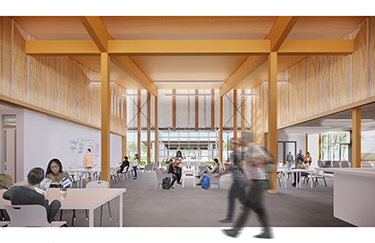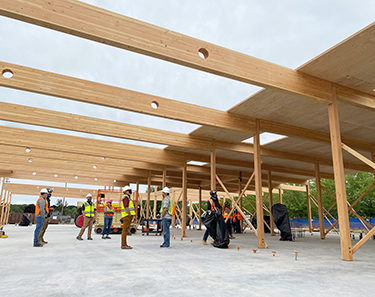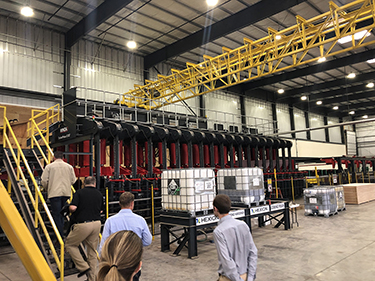|
Subscribe / Renew |
|
|
Contact Us |
|
| ► Subscribe to our Free Weekly Newsletter | |
| home | Welcome, sign in or click here to subscribe. | login |
Architecture & Engineering
| |
 |
April 15, 2021
Sourcing regional materials for higher ed
FFA Architecture & Interiors

Running
|
At FFA, we understand architecture is about making connections.
In 2018, FFA was hired to design a new, highly sustainable agricultural complex for Chemeketa Community College. For the project, using materials from the region was key to the college’s goals and design intent. During the visioning process, we determined the best way to achieve this aspiration was to use locally sourced mass timber.
To make mass timber a reality, the project team fostered connections among the design, construction and timber industries in our region. Along with FFA, these groups included Swinerton, the project’s general contractor, Freres Lumber, the project’s mass timber manufacturer and supplier, Chemeketa Community College, and the UO/OSU Tallwood Design Institute, a beacon of mass timber research and education for our region and beyond.
On a project with a fixed budget, Swinerton played a vital role in finding the most efficient use of mass timber. With the agricultural complex consisting of single-story structures, the original design intent was to use glue-laminated timber (glulam) columns and beams to support a cross-laminated timber (CLT) roof.
Through a collaborative design process, Swinerton was able to recommend the new mass timber product, mass plywood panels (MPP), as the most efficient and cost-effective roof system. The thin individual laminations of plywood that make up the panels allow for smaller incremental changes to MPP thickness. These can be increased or decreased depending on structural demands. Using a rigorous small-span structural grid, the design team reduced the roof MPP thickness to just 2 inches for much of the building.?
Understanding the physical performance of MPP was only part of the process. The design team discovered employing MPP on the agricultural complex had inherent aesthetic, sustainability and financial benefits. Oregon-based Freres Lumber is the lone MPP manufacturer in the world and its facilities are less than 30 miles from Chemeketa Community College’s Salem campus. The near location greatly reduced delivery distance compared to other building materials and helped support the region’s economy.
The reduced transportation footprint and the fact that MPP is made from renewable timber and plywood veneers which make more efficient use of raw tree material than sawn lumber, makes MPP an environmental choice.
As soon as MPP was proposed as a possibility for the project, the team worked together to better understand potential challenges. FFA and Chemeketa visited Freres’ Lyon, Oregon, manufacturing facility. There they were able to discuss project goals, learn more about the MPP manufacturing processes, and gain a fuller understanding of the options available for use as a finished product.
Fostering this relationship helped increase the college’s comfort level of using a new product with a unique visual appearance. Understanding the goal of putting a key local agricultural product on display, FFA and Freres were able to work together to accommodate a higher-grade finish veneer on the exposed underside of the panels. Together, the team was able to deliver a clean, hardworking aesthetic that suits the “roll-up-your-sleeves” nature of the agricultural academic program.
The relationship between Chemeketa and Freres helps both the region’s education and timber industries. Chemeketa has a great legacy as a community educator and serves local industries with a strong talent pool. As they better understand the latest innovations in mass timber and the direction of the industry, they have the option to tailor and expand their education services to align with industry goals. Freres and Chemeketa intend to remain allies well beyond the construction life of this project.
On several occasions, the design and client team hosted Judith Sheine, the design director of the Tallwood Design Institute (TDI), and students from the University of Oregon for site tours during the construction process. TDI is the leading resource for mass timber research and education for both students and industry professionals. Having previously connected with TDI, the Chemeketa Agricultural Complex provided FFA and Swinerton with a unique opportunity to build on an existing relationship.
During the site visit, TDI was able to document unique details about the use of MPP because it was still exposed. They had the opportunity to ask the design and construction teams specific questions in real time. FFA will continue to engage with TDI by reviewing student projects and sharing design documents for the agriculture complex as well as other firm projects that use mass timber. Our goal is to support them as they continue to build industry knowledge around developing mass timber products.
The Chemeketa Community College Agricultural Complex grand opening is scheduled for late summer 2021. The now-complete net-zero project is a testament to innovative sustainability. Situated on an 8-acre site, a 15,000-square-foot academic building houses flexible learning and research areas along with working spaces for students, faculty, staff and partners. The primary structural system for the main and outer buildings features MPP and glulams. A light-filled, double-height space will be the collective center of the main building with views out through a large glass wall and an overhead door that will open onto demonstration gardens to the south. A covered arcade protects the building along the south facade with a photovoltaic roof structure serving as a shelter and to harness energy from the sun to support the building.
All collaborators are excited to showcase a building that highlights the use of exposed MPP. The Chemeketa Agricultural Complex is a local resource for future project design teams and a place to display what has typically been a more industrial product, in a high-quality academic building environment. Mass timber products are often seen as an alternative to concrete and steel and are often proposed on multi-story projects. The agricultural complex illustrates how MPP is a viable choice for smaller projects with limited budgets, and a showcase for mass timber in the Pacific Northwest.
Edward Running, associate partner, is a project manager and designer with 23 years of experience in higher education, corporate, public and residential projects.
Other Stories:
- Seattle’s U District housing boom: is there room for it?
- New design requires thoughtful programming
- Early-stage design helps Hermanson with UW center
- How to make master plans that work
- The post-pandemic educational learning curve
- The evolution of campus, a new normal for higher education
- Sustainable student housing building design for higher education
- The evolving building delivery models at higher education institutions





